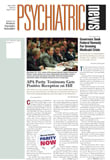A Walgreens customer in Fort Lauderdale, Fla., became distraught in April after she received a free, unsolicited month’s supply of Prozac Weekly in the mail along with a letter from her physicians endorsing the medication. The woman sued Walgreens Co., Prozac manufacturer Eli Lilly and Co., and her doctors for invasion of privacy. She also charged her doctors with malpractice.
Florida Attorney General Bob Butterworth is investigating how widespread the Prozac Weekly mailing was and whether any Florida laws, including the Deceptive and Unfair Trade Practices Act and the Medical Practices Act, were violated. Federal law also prohibits the dispensing of prescription drugs without a prescription. The attorney general will also determine whether the health professionals who were handling the woman’s care—two internal medicine physicians and a physician assistant, along with a family practice physician at Holy Cross Hospital in Fort Lauderdale—are guilty of violating the state’s medical practice law.
“This type of activity raises serious questions in the areas of both public health and marketing,” Butterworth said in a press release. “Physicians and pharmacists exploiting their relationship with patients to market drugs for big pharmaceutical manufacturers and pharmacy companies is also a troubling potential violation of Florida law. Of all people, patients should be able to trust their physician and pharmacist to have only the patient’s health in mind when prescribing and recommending medication.”
“The law protects patient confidentiality and requires physicians to examine and evaluate a patient’s current needs before prescribing drugs,” said Butterworth in the statement.
Psychiatrist and APA Trustee David Fassler, M.D., wrote in a letter to the editor published in the July 10 New York Times that the mailing incident “highlights the continuing erosion of privacy and patient confidentiality in our nation’s health care system. Pharmacies, pharmaceutical companies, and physicians should never access or use identifiable clinical information about specific patients for commercial or marketing purposes.”
Walgreens is the second-largest national retail drugstore chain in the nation.
In a press statement, Lilly called the Prozac mailing an isolated incident that is “inconsistent with Lilly policy.”
“While Lilly supports informing people about new treatment options and encouraging them to discuss these options with their doctor, what occurred in Florida appears to go beyond this,” according to the statement.
Lilly promised to conduct a thorough investigation of the Florida incident and take appropriate action. “We understand why people would be concerned about receiving unsolicited prescriptions in the mail. To the extent Lilly personnel participated, Lilly apologizes to those patients affected by it,” Lilly said.
Crystal Wright, vice president of media relations at the National Association of Chain Drug Stores, agreed with Lilly that the mailing of Prozac Weekly in Florida was an isolated incident.
“Pharmacies commonly send advisories to patients about new brand-name or cheaper generic drugs that may be related to the patient’s illness and reminders to refill prescriptions,” said Wright.
She emphasized that pharmacy communications are supposed to indicate whether they are funded by drug companies and that drug companies do not see patients’ medical records.
Walgreens and Savon Drugs send out pharmacy letters to patients, while Rite-Aid sends patients advisories on generics and brand-name drugs, according to the June 11 Washington Post. CVS said it sends only refill reminders to patients.
The Bush administration would allow pharmacies to mail marketing letters to patients without their prior authorization under proposed changes to the privacy rule of the Health Insurance Portability and Accountability Act. The privacy rule is slated to take effect next April (Psychiatric News, May 3; see box on page 2).
“Patient education, patient compliance, disease management, and wellness programs are not defined as marketing activities in the revised rule,” said Joanne Hustead, senior counsel at the Health Privacy Project at Georgetown University in Washington, D.C., in an interview.
APA has called on the Bush administration to eliminate these marketing provisions. Without their elimination and a requirement that patients are told how to “opt out”of receiving drug-marketing letters, the protections are meaningless, said Hustead.
“Walgreens’ dispensing of drugs through the mail was most likely an isolated incident, but we are concerned that more egregious practices by pharmacies and drug companies will occur if the proposed federal changes are adopted,” said Hustead.
A press release describing the Prozac mailing investigation by the Florida attorney general can be accessed at http://legal.firn.edu by clicking on “Subpoenas issued to determine whether unsolicited Prozac mailing violated Florida law.” ▪
